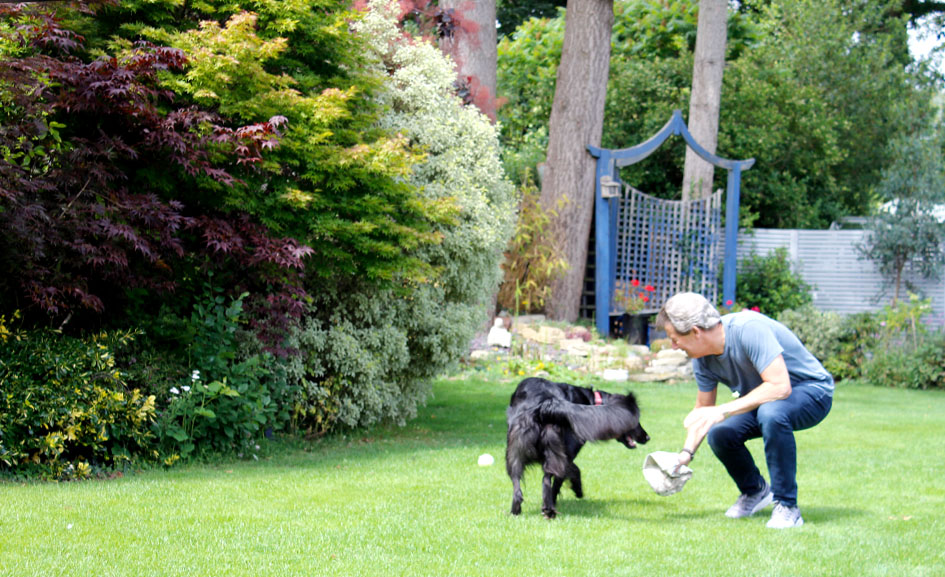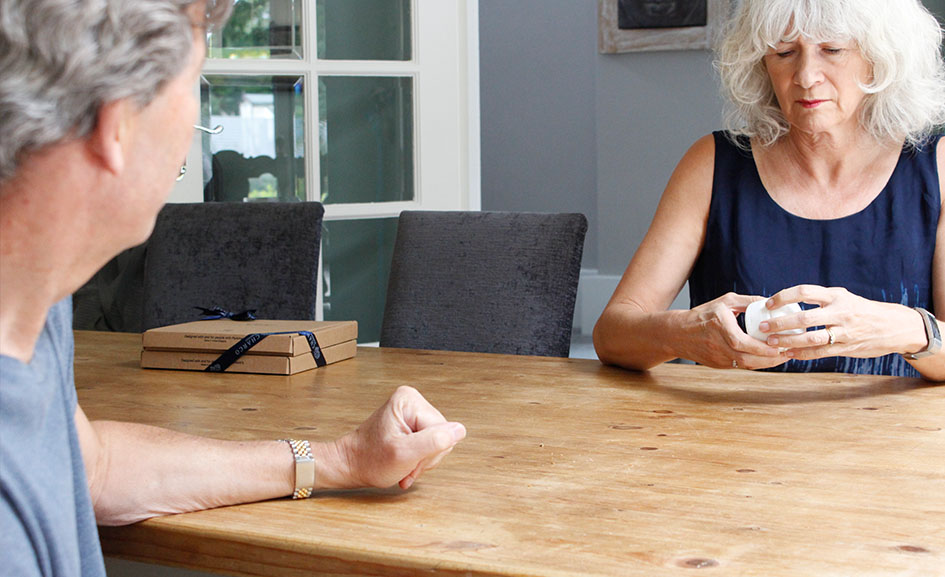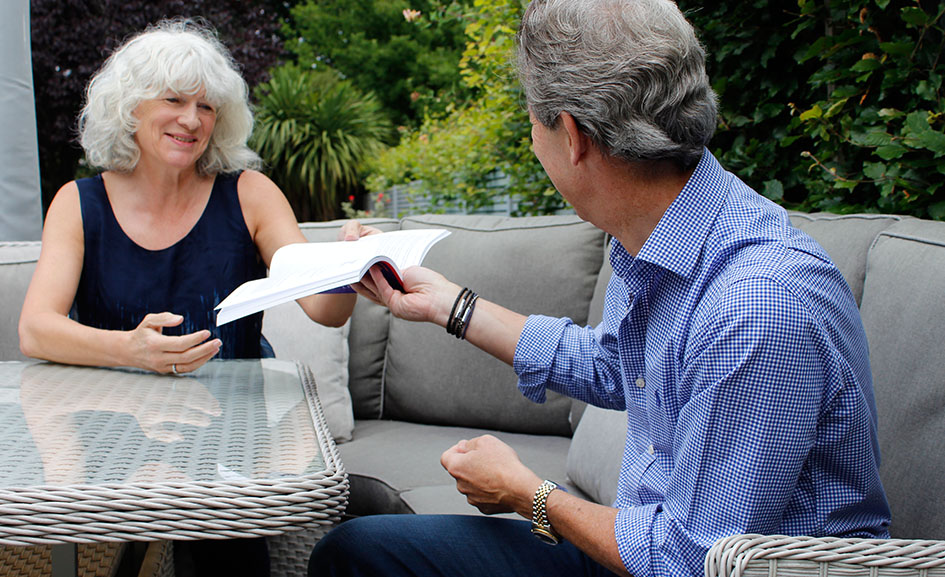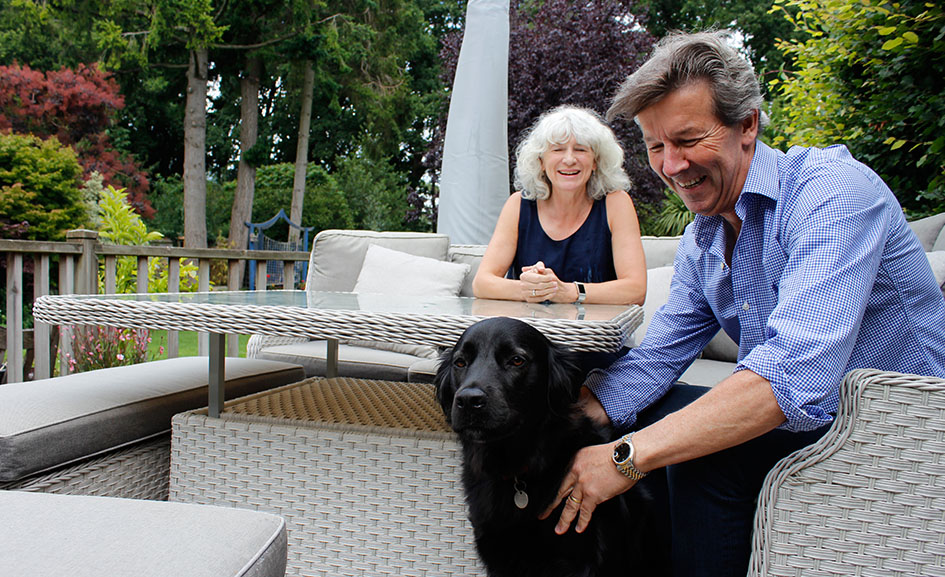Mark was asked to walk up and down the corridor, sat down, informed that he had Parkinson’s and was sent on his way.
His wife, Carolyn, tells us she could see him shuffling one of his legs and his left arm staying still when he walked. Mark, an avid squash player, noticed it was impinging his movement. He knew he wasn’t hitting the ball quite as well as he used to and put it down to getting old. Carolyn is quick to remind him, “well, you still won a lot!”.
Googling his symptoms led Mark to pursue his diagnosis and see a specialist. This drive to research his condition and learn as much as possible about it continues today, six years later. Mark refers to Parkinson’s as a “bespoke” disease, saying that his version will be ‘very different to others’. While this could be concerning, he tries to find out what he can do to affect the disease’s trajectory himself, doing all that he can to slow the progression.
A holistic approach to Parkinson’s
Mark was disheartened by the attitude towards Parkinson’s from his consultants, which he summarised as “Ah, you have a brain disease; take some dopamine and we’ll see you in a year”. Instead, he thinks that when you are diagnosed they should address your lifestyle including what you eat, your activity, your mood, “all these elements that contribute to the demise of your brain cells”. He notes that the NHS unfortunately does not have the resources to provide this for everyone.
The importance of exercise and movement
Mark has been attempting to examine these lifestyle factors on himself. Knowing that exercise is the only thing proven to slow the progression of Parkinson’s, Mark believes that playing squash for the last twenty years at a high intensity is probably the reason his symptoms remain stable. “If I do a lot of exercise for a month I’m not as stiff first thing in the morning. If I didn’t do it I’d be more cranky and wincing myself out of bed”. He notes that even simple yoga or stretching for about fifteen minutes a day is beneficial. It helps to “encourage your body to make the connection from brain to limbs to keep the movement process going”. He gives the analogy that those with Parkinson’s have a dialup connection compared with others having 4G! The message from brain to limb that you’re trying to move is a lot slower with Parkinson’s, but keeping fit, exercising, and good nutrition helps to keep that pathway more accurate and effective.

For Mark, regular HIIT (High Intensity Interval Training) makes a big difference to his daily life. It improves movement, limits stiffness and very importantly lifts his mood. The beauty of HIIT is that you can start at any level of fitness and tailor the session to your own abilities. You just do as much as you feel comfortable with that day and then challenge yourself to improve over time.
He adds that while telling us this, his thumb is shaking and he can feel his leg twitching, because talking about his symptoms does increases his anxiety and adrenaline levels. Many believe adrenaline uses the already depleted levels of Dopamine that those with Parkinson’s have, causing symptoms to worsen; you can read our blog in which a movement specialist spoke more on this topic here.
The right nutrition to fuel your body
Mark knows that while some people assume ‘nutrition’ simply refers to ‘dieting’, what you eat is the fuel for all your cells. “Why wouldn’t you look at those things to improve performance?”. There is now a school of thought which says that Parkinson’s is a gut-based disease. Mark had been interested in what he’s fuelling his body with for a few years when Carolyn introduced him to The Body Coach (Joe Wicks’s) exercise and food programme. Now, Mark is visiting a leading nutritionist who specialises in Parkinson’s to look at his body in a systematic way. He will have blood, urine and stool samples collected to help identify the optimal foods for his symptoms and effective delivery of his drugs.

As with exercise, Mark finds it easy to see the direct effects of what he consumes on his symptoms. For example, as an experienced Skier he recounts how just last year his performance would change as his drugs wore off. From Skiing very well when the drugs were at their most effective, his performance dropped noticeably to him and his friends as time went on. After taking the next dose of his medication, the quality of his skiing was restored when going back down the same mountain some 20 minutes later. Interestingly however, he noticed that a glass of wine at lunchtime took away the effect of his afternoon dose, so the next day he abstained from wine and skied well all day! Mark knows the effects of the wine weren’t the same as being drunk; he explains that when he comes back from a BBQ late at night he staggers, even without consuming any alcohol, because his medication is wearing off. He describes the sensation as “feeling like someone’s taken the rhythm out of your step. It’s really strange”. It seems clear therefore that what Mark eats and drinks has the power to influence the efficacy of his medication.
When we discuss the types of foods that Mark’s nutritionist has recommended he steer clear of, Mark reels off a list including: gluten, dairy, lectin (pulses, beans and peas), alcohol and coffee. At the last two, he adds, “those might be a stretch too far, but we’ll see”, Carolyn joking, “I think the gluten was a stretch too far, wasn’t it?”.
Although Mark advocates for doing your own research he stresses that it’s important to share your plans with your specialist. “There are a lot of ideas that seem to ‘help’ one or two people out there”. Unfortunately, there are also people who will try to take advantage of the situation a person with Parkinson’s is in. Mark tells us about people he has found online who claim they’ve managed all of their symptoms through what they eat and certain vitamin supplements. However clicking onto their websites he finds that they’re actually just selling these supplements to make a profit.
Piecing together a puzzle
In order to test the accuracy of the advice he’s getting Mark has begun collecting data. He records all of his exercise, vitals, calories, daily step counts as well as the food and drink he consumes. Then, he assesses his symptoms and how they change based on what he does with his body. If one day he feels a spike in his symptoms, he can go back to his diary to pinpoint what may have caused it. Dietitian Richelle Flanagan also recommends keeping a food diary; you can read her advice in our blog post here.
Because of the “bespoke” nature of Parkinson’s, the effect of timing and type of food may differ from person to person. For this reason, Mark believes that your “personal journey” with Parkinson’s should involve independently recording your own data, although it doesn’t have to be particularly scientific; he just tries to collect as much as possible. Mark’s efforts to improve his own health feels like solving one big puzzle, and each recording gets him one step closer to success.
Coming to terms with a Parkinson’s diagnosis and the changes it will bring
When Mark was first diagnosed, it took him a long time to tell even his close family. Today, he and Carolyn have many close friends who are still unaware. Part of the reason they delayed telling people, Mark explains, was that he didn’t want anyone to feel sorry or make excuses for him; particularly when it comes to playing squash. But another contributing factor was that “it’s about getting used to it yourself and the problems that it brings”.

Clearly, Carolyn has been an incredible support to help him. She jokingly tells him that if you’re going to have one of the tough diseases, Parkinson’s is probably the best. “You’ve got to find some kind of positivity somewhere, don’t you?”. She has also joined Mark in following the specialised diet (whispering, she does this “most of the time”, away from his earshot).
He acknowledges her support with equal humour. Mark jokes that if he annoys Carolyn, knowing that there may come a day when his movement is so restricted he will struggles to turn around, she’ll leave him stuck in a corner facing the wrong way. “If you find out I’ve moved to a lighthouse with round walls, you’ll know why!”.

On adapting one’s lifestyle to living with Parkinson’s Mark says, “you need to prepare yourself to make that big change in your life”. To cut back on the things that you normally eat, “it’s almost like you have to take a big deep breath and say, ‘I’m going to make this change’, because the change is going to be forever. It takes a while to make that first step”.
Spreading the message of the holistic approach to treating Parkinson’s
Mark’s drive to research his own version of Parkinson’s extends beyond himself; he believes it’s fundamental for people to learn what affects their drugs and what they need to do to make the effects last longer. He calls this the “nirvana” for everybody. Ideally, he would like people diagnosed with Parkinson’s to be able to help themselves with no pharmacological interventions whatsoever; whether it’s with dietary changes, exercise, or non-invasive technology.
He wants to spread the message that there’s more that you can do to help yourself without massive expense, and adds, “Eating better is going to be better for you, full-stop. Doing exercise is going to be better for you, full-stop, whether you’ve got Parkinson’s or not”.
We’re so grateful to Mark and Carolyn for sharing their story, and for inspiring us to be more conscious of how we fuel and utilise our bodies.